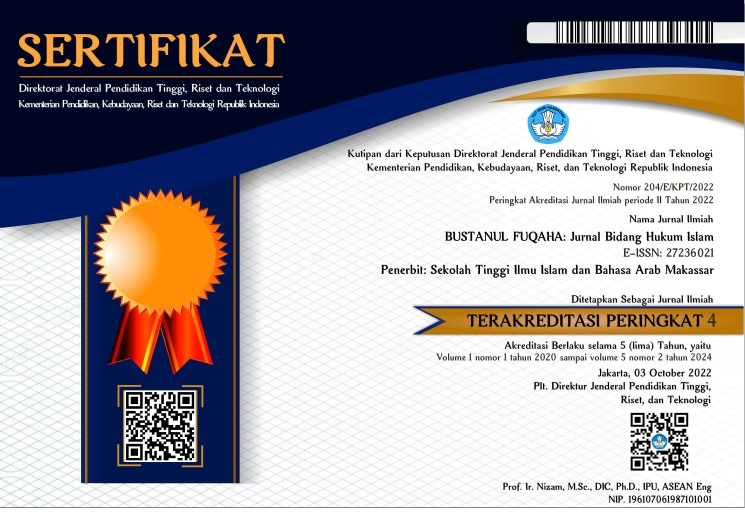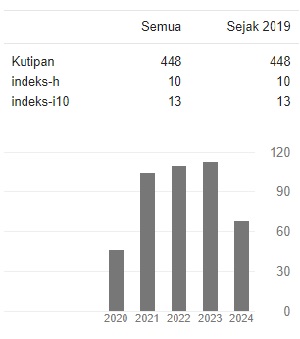Studi Komparasi Kesaksian Wanita dalam Hukum Pidana Islam dan Hukum Perdata Islam
DOI:
https://doi.org/10.36701/bustanul.v1i1.122Keywords:
women, violence, criminal, law, civilAbstract
This study explains that in the view of Islamic law on women's testimony in Islamic criminal law is that in Jarimah ḥudūd, kisas and takzir there are two conditions that could have occurred. Therefore, the two legal studies have similarities and differences, the location of the similarities can be seen from their position as well as their role as witnesses, namely in terms of their position as one of the evidences in the process of problem solving and in terms of their roles equally contributing to provide true information in accordance with what women see, hear and / or feel / experience it yourself. Whereas the difference in general is that in Islamic criminal law, jumhur ulama are of the opinion that a woman's testimony is rejected, meaning that a minority is accepted, and even then in a very urgent situation, while in Islamic civil law all ulama are of the opinion that a woman's testimony is accepted meaning that there is not a single ulama who reject it and there are even some cases that prioritize women's testimonies over men's testimonies namely issues that are specifically in the area of women.
Downloads
References
Aminuddin, “Kesaksian Wanita Sebagai Alat Bukti dalam Kasus Hukum Pidana Islam (Analisis Pemikiran Ibnu Hazm dan Relevansinya dengan Hukum Positif Di Indonesia)”. Tesis, Jurusan Syariah, UIN Sultan Kasim Riau, 2014.
Al-Buṭi, Ramadhan dan M. Sa’id. al-Mar’ah Baina Ṭugyāni an-Niẓām al-Gharbi wa Liṭaifi at-Tasyrī’ ar-Rabbani. Diterjemahkan oleh Darsim Ermaya Imam Fajaruddin dengan judul Perempuan antara Kezaliman Sistem Barat dan Keadilan Islam. Cet. I; Karangasem: Era Intermedia, 2002.
Al-Fauzan, Ṣāleḥ bin Fauzan bin ‘Abdillah. Al-Mulakhkhaṣ Al-Fiqh. Diterjemahkan oleh Asmuni dengan judul Ringkasan Fikih Lengkap. Jilid I-II. Cet. I; Jakarta: PT. Darul Falah, 2005.
_______. Tanbīhat ‘alā Aḥkāmin Takhtaṣṣubi al-Mu’mināt. Diterjemahkan oleh Rahmat al-Arifin Muhammad bin Ma’ruf dengan judul Sentuhan Nilai Kefikihan Untuk Wanita Beriman. Cet. I; Makassar: IAIN Alauddin Makassar, 2003.
Al-Gaffar, Abdur Rasul Abdul Hasan. al-Mar’ah al-Mu’āṣirah, diterjemahkan oleh Bahruddin Fanami dengan judul Wanita Islam dan Gaya Hidup Modern. Jakarta: Pustaka Hidayah, 1984.
Hatta, A. (2017). Daya Serap Hukum Islam di Indonesia pada Bidang Privat. NUKHBATUL'ULUM: Jurnal Bidang Kajian Islam, 3(1), 12-18.
http://www.usahataqwa.com/rohaniah/syarat-taubat/ diakses pada tanggal 17 Agustus 2016.
Ibnu Qayyim, al-Ṭurūq al-Ḥukmiyah. t.t; Penerbit Muniriyah, t.th.
Kementrian Urusan Agama Islam, Wakaf, Da’wah dan Irsyād Kerajaan Saudi Arabia, Al-Qur’ān dan Terjemahnya. t. Cet; Madinah: Percetakan al-Qur’ān al-Karim Raja Fahd, 1426 H.
Ikhsan, M. (2018). Sejarah Mazhab Fikih di Asia Tenggara. NUKHBATUL'ULUM: Jurnal Bidang Kajian Islam, 4(2), 120-134.
Al-Sābiq, Sayyid. Fiqh al-Sunnah. Diterjemahkan oleh Mudzakkir dengan judul Fikih Sunnah. Jilid XIV. Cet. III; Bandung: PT. al-Ma’arif, 1993.
Shihab, M. Quraish. Perempuan. Cet VIII; Tangerang: Lentera Hati, 2013
Al-Sibā’ī, Mustafa. al-Mar’ah Bainah al-Fiqh wa al-Qānūn. Diterjemahkan oleh Chadijah Nasution dengan judul Wanita diantara Hukum Islam dan Perundang-undangan. Jakarta: Bulan Bintang, t.th.
Al-Zuhailī, Wahbah. Al-Fiqh Al-Islāmī wa Adillatuhū. Juz 4. Damaskus: Dār al-Fikr, 1986, dalam http://abdulghani07.blogspot.co.id/2014/02/hak-hak-didalam-islam.html diakses pada tanggal 17 Agustus 2016.














